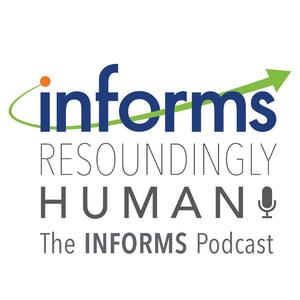Published: November 18, 2022

Welcome back for another in a special series of the Resoundingly Human podcast, filmed and recorded in person in Indianapolis at the 2022 INFORMS Annual Meeting. I’m joined by Brian Macdonald at Yale University. He is a keynote presenter at this year’s Annual Meeting, Sports Analytics, and he has kindly taken some time out of his busy meeting schedule to share special insight into, well, all things sports analytics!
I think the player tracking data is not untapped, but I think there’s still a lot that can be done with that, that hasn’t been done yet. It’s somewhat new in some sports, even like hockey just within the past couple years they’ve got player tracking data. It’s been around for a while in basketball but the quality is improving and the data that’s available just keeps improving.
Interviewed this episode:

Brian Macdonald
Yale University
Brian is currently a lecturer in the Department of Statistics and Data Science at Yale University. He was previously Special Faculty in Sports Analytics in the Department of Statistics and Data Science at Carnegie Mellon University, the Director of Sports Analytics in the Stats & Information Group at ESPN, Director of Hockey Analytics with the Florida Panthers Hockey Club, an Associate Professor in the Department of Mathematical Sciences at West Point, and an Adjunct Professor at University of Miami and Florida Atlantic University. He received a bachelor of science in electrical engineering from Lafayette College, and a master of arts and a Ph.D. in mathematics from Johns Hopkins University.
Related Episodes
Episode Transcript
So I’m here in Indianapolis for the 2022 INFORMS Annual Meeting, our first officially fully in person meeting since before the pandemic in 2019. We’re recording a live podcast, quote-unquote, “live” version of the INFORMS Resoundingly Human podcast. I’m joined by Brian McDonald, who has just finished doing his keynote address, Sports Analytics, and he’s joining me to talk a little bit about, well, sports analytics. So Brian, thank you so much for joining me.
Brian MacDonald:
Hey, thanks for having me.
Ashley Kilgore:
So I have to know what came first for you, an interest in sports or in analytics? I think I already know the answer, but let’s get it officially.
Brian MacDonald:
Well, probably I would have to answer that by saying sports came first. Mostly because analytics wasn’t a word that I even knew when I was a kid, so I don’t even know if it was a word that existed in common language back then. So for sure growing up I liked sports a lot. I play a lot of baseball and basketball, a little bit later on hockey. I always liked math actually, so that was very early on, I liked mathematics. But yeah, didn’t really start doing analytics or even know what it was probably until graduate school.
Ashley Kilgore:
Okay, interesting. That was kind of what I suspected, that the sports came first. Could you share a bit more about your background? I know you’re currently with Yale, you’ve actually spent some time working for ESPN previously. Could you walk us through your professional journey?
Brian MacDonald:
Sure. So I went to undergraduate at Lafayette College and was an electrical engineering major. Started at Johns Hopkins as electrical engineering and after a semester switched to math. So I ended up doing my PhD in math there. Right after I defended my PhD thesis, I started working on sports analytics basically.
Ashley Kilgore:
Okay.
Brian MacDonald:
My first job out of school was at West Point as an assistant professor, and that was a good place to start learning about sports analytics and statistics and so forth because it was a very applied department. So I started doing sports analytics research there. Eventually started talking with teams, eventually through a friend of a friend of a friend got in touch with the Florida Panthers, and eventually went down to work for the Florida Panthers full time as director of hockey analytics.
Ashley Kilgore:
Oh, wow.
Brian MacDonald:
Then after four years there, I spent a year at University of Miami, and then I moved up to Connecticut and was with ESPN, and then I spent some time at Carnegie Mellon, and now I’m at Yale. So I kind of floated back and forth between academia and industry a little bit. Certainly pros and cons of both. Happy to be back in academia though, and I think I’ll probably stay for a while.
Ashley Kilgore:
That’s interesting. We actually did another podcast here. I actually had two guests and we looked at the different paths that they took, one in industry and one in academia. Sort of geared towards a lot of the attendees here who are going to be making that choice or are in the middle of making that choice. So that’s interesting that you have gone back and forth to both. That’s really interesting. So sort of set the stage. Could you give a brief history of how analytics was first introduced to sports, or the meet cute for sports and analytics?
Brian MacDonald:
Yeah, I think there’s been some analytics, or at least statistical analysis of sports, maybe not called analytics, being done for decades, even back when there wasn’t as good of data as there is now. Even just with just basic game summary data, you can do things. I come up with team ratings. This is the first thing I talked about in my talk actually, was just with basic game information, final score, the teams, the date, where it was played, who was home team and so forth, you can use a simple regression model to come up with team ratings. So it’s been going on for a while.
I think one of the key moments was actually the book Moneyball and then the movie Moneyball, which even more people saw. It was really building in baseball before then. Maybe not so much in other sports, but it was becoming a lot more popular in baseball. Then I think there was maybe a tipping point or a trigger that it just set off analytics to be widely used in sports. And then I hear people from other industries, not so much recently, but back then, basically say, “Well, we want to do Moneyball, but for…” Fill in a blank “… of my industry.” So it was really something that I think helped move analytics forward in sports, but also analytics forward in other fields which maybe were not considered traditional fields where data was analyzed. I guess data was being used in finance and medicine and things like that. But yeah, I think Moneyball helped people realize that it could be applied to anything, even things that you wouldn’t think of.
Ashley Kilgore:
That’s interesting, I didn’t know that. So how has the role of analytics in sports of continued to develop since then?
Brian MacDonald:
Yeah, so I think a lot of it has to do with, I guess, a couple of things. Just as an analyst, there’s a couple of things that you have to do. You have to analyze data and then you have to communicate what you find with others. So I think the role has changed in the sense that data has changed. There’s a lot more data available now. There’s player tracking data where you have the locations of the players in the ball several times a second throughout the entire game. And that takes a different set of analysis tools and statistical techniques. I also think it’s changed because the communication aspect has changed also, just as analytics becomes more accepted, there’s certain things when you’re communicating what you’re doing to someone in the organization, maybe 10 years ago maybe you had to spend more time trying to convince them that using data is going to help them make decisions. Maybe in a lot of organizations that’s no longer something that they have to spend time on. It’s more specific to that they’re working on so they can get into more details.
I mean it’s hard to know what’s going in on inside the organizations, but I would think the communication is hopefully, as time goes on, more sort of bidirectional communication. In an ideal situation, the analyst gets ideas from just hearing what the coaches are talking about. The coaches have ideas that they come to the analysts with and say, “Hey, can you take a look at this?” So I think that aspect of things has gotten a lot better and what the analyst has to focus on is just changed a little bit.
Ashley Kilgore:
So is there any area of sports analytics that you think or feel is sort of untapped, the next great application?
Brian MacDonald:
Yeah, I mean I still think the player tracking data, it’s not untapped, but I think there’s still a lot that can be done with that that hasn’t been done yet. And it’s somewhat new in some sports, even like hockey just within the past couple years got player tracking data. It’s been around for a while in basketball. But the quality is improving and just the data that’s available just keeps improving. So I think the player tracking data and then eventually… In baseball, there’s now pose data, which is basically you know the locations of limbs of the players, not just where the center of mass of the player is or just generally where the player is standing. You have where all the limbs are, so you know where the pitcher is releasing the ball and things like that. That’ll be useful in other sports too, if that data becomes available, in basketball where a defender has his hand… How close is the hand when he is guarding a player? Things like that.
So that’s something that’s untapped, mostly because it’s not available yet in most places. There’s probably lot to be done with biomedical data and some stuff’s being done internally in teams, but that might be another area where teams can gain an advantage by working with data.
Ashley Kilgore:
Okay. That’s interesting. Well, I think this was obvious from how you came to be in sports analytics. Sports came first. Do you think there’s a way to use that, that people are interested in sports as a hobby, and also potentially professionally, to entice and inform sort of the next generation in this field?
Brian MacDonald:
Yeah, for sure. And there’s a lot of people in academia who use sports in their classes to get students interested in statistics and data science, operations research, economics, business, computer science. In fact, I’m part of a group of professors at… Let’ see if I get this right, Baylor, Carnegie Mellon, Pitt, St. Lawrence, West Point and Yale. We got together and wrote an NSF grant where the topic was exactly Using Sports Analytics to Get Students Interested in Data Science. So yeah, this is definitely useful to use sports to get students interested in data science, something that’s pretty popular, pretty widely popular. It’s a situation where the students have some sort of subject matter expertise before they start working on it because they’ve played sports or they watch sports or whatever, so yeah.
Ashley Kilgore:
It’s always nice to love what you do.
Brian MacDonald:
Yeah.
Ashley Kilgore:
I feel like sports analytics, it’s not necessarily a buzzword, but it’s becoming a term that most people have an understanding of, or at least think they have an understanding of. Is there something that you wish maybe the average person, when I say the average person, someone without an analytics background, knew about sports analytics?
Brian MacDonald:
I think one of the things that… This is probably true for all data analytics, but just it takes a long time to create models or even just to work with raw data and clean the data and organize it before you even start building a model. There’s a lot of time that needs to be spent on that. But it is worth it in the end because eventually it can be automated or semi-automated and you don’t have to worry about it so much anymore. But there’s a lot of stuff going on behind the scenes that you can’t see necessarily on the TV, you see the final results on the TV, but there’s a lot of data engineers and so forth working behind the scenes, just working on the data to get the data. The data is the foundation and you just got to spend a lot of time on the foundation.
Ashley Kilgore:
Brian, thank you so much for joining me. This was super fun and informative, especially for your non-sports savvy host. So thank you so much.
Brian MacDonald:
All right, thank you for having me.
Ashley Kilgore:
Want to learn more? Visit resoundinglyhuman.com for additional information on this week’s episode and guest. The podcast is also available for download or streaming from Apple Podcasts, Google Play, Stitcher, and Spotify. Wherever you listen, if you enjoy Resoundingly Human, please be sure to leave a review to help spread the word about the podcast. Until next time, I’m Ashley Kilgore and this is Resoundingly Human.
Want to learn more? Check out the additional resources and links listed below for more information about what was discussed in the episode.
2022 Annual Meeting: Sports Analytics
Brian Macdonald, Yale University
Video interview with Brian Macdonald
Tags: analytics, baseball, basketball, football, hockey, player tracking data, sports


